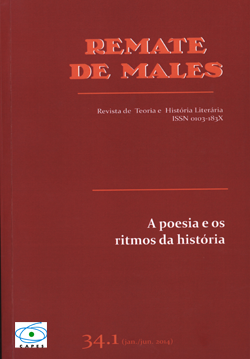Resumo
This paper proposes a reflection on the relation between the concept of rhythm and the concept of gender. In insisting on the necessity of the destabilization of the principal oppositions involved in the elaboration of the idea of rhythm, those between the regularity and the flux, the individual and the society, as well as between the nature and the culture, the text emphasizes the importance of the rhythm as an articulation of a dynamic form. In addition, the reflection on the rhythm and its relation to the gender points to the necessity of a questionnig of its effects, participation and resistence.
Referências
ADORNO, Theodor W. Sobre a Ingenuidade Épica. In: Notas de literatura I. Trad. Jorge de Almeida. São Paulo: Duas Cidades: Ed. 34, 2003.
AKHMATOVA, Anna. Poemas. Trad. Joaquim Manuel Magalhães, Vadim Dmitriev. Lisboa: Relógio d’Água, 2003.
BACHMANN, Ingeborg. Anrufung des Grossen Bären. Gedichte. München: Piper, 1961.
BENVENISTE, Émile. A noção de ‘ritmo’ na sua expressão linguística. In: Problemas de linguística geral I. Campinas: Pontes, 2005.
CLÉMENT, Catherine, KRISTEVA, Julia. O feminino e o sagrado. Rio de Janeiro: Rocco, 2001.
CHODOROW, Nancy. Family Structure and Feminine Personality. In: ROSALDO, Michelle Zimbalist, LAMPHERE, Louise (org.). Woman, Culture, and Society. Stanford: Stanford University Press, 1974.
CIXOUS, Hélène. The Laugh of the Medusa. In: ADAMS, Hazard, SEARLE, Leroy (org.) Critical Theory since 1965. Tallahassee: University Press of Florida, 1986a.
CIXOUS, Hélène. Entre l´écriture. Paris: Des Femmes, 1986b.
DAVID-MÉNARD, Monique, DEUTSCHER, Penelope. Gender. In: CASSIN, Barbara (org.) Vocabulaire européen des philosophies. Paris: Seuil&Le Robert, 2004.
HARTWIG, Julia. Gorzkie żale. Kraków: Wydawnictwo a5, 2011.
KRISTEVA, Julia. La revolution du langage poétique. Paris: Seuil, 1974.
KRISTEVA, Julia. Pouvoirs de l’horreur. Essai sur l’abjection. Paris: Seuil, 1980.
LEFEBVRE, Henri. Rhythmanalysis. Space, Time and Everyday Life. London: Continuum, 2004.
ŁEBKOWSKA, Anna. Gender. In: MARKOWSKI, Michał Paweł. NYCZ, Ryszard (org.). Kulturowa Teoria Literatury. Główne problemy i pojęcia. Kraków: Universitas, 2002.
MANDELSTAM, Óssip. Staat und Rhythmus. In: Über den Gesprächspartner. Gesammelte Essays 1913-1924. Frankfurt: Fischer, 1994.
MAUSS, Marcel. Sociologia e antropologia. Trad. Paulo Neves. São Paulo: Cosac Naify, 2003.
MESCHONNIC, Henri. Critique du rythme. Anthropologie historique du langage. Paris: Verdier, 1982.
MOORE, Marianne. The Complete Poems of Marianne Moore. London: Faber and Faber, 1994.
OAKLEY, Ann. Sex, Gender and Society. London: Temple Smith, 1972.
ORTNER, Sherry B. Is Female to Male as Nature Is to Culture?. In: ROSALDO, Michelle Zimbalist, LAMPHERE, Louise (org.). Woman, Culture, and Society. Stanford: Stanford University Press, 1974.
PLESSNER, Helmuth. Ausdruck und menschliche Natur. Gesammelte Schriften VII. Frankfurt am Main: Suhrkamp, 2003.
POŚWIATOWSKA, Halina. Właśnie kocham. Indeed I love. Kraków: Wydawnictwo Literackie, 1997.
STORNI, Alfonsina. Antología poética. Buenos Aires: Editorial Losada, 1998.
TYNIANOV, Iuri. O ritmo como fator construtivo do verso. In: LIMA, Luiz Costa. Teoria da literatura em suas fontes. Vol. 1. Rio de Janeiro: Francisco Alves, 1983.
VALÉRY, Paul. Tel Quel. Paris: Gallimard, 2008.

O periódico Remate de Males utiliza a licença do Creative Commons (CC), preservando assim, a integridade dos artigos em ambiente de acesso aberto.

